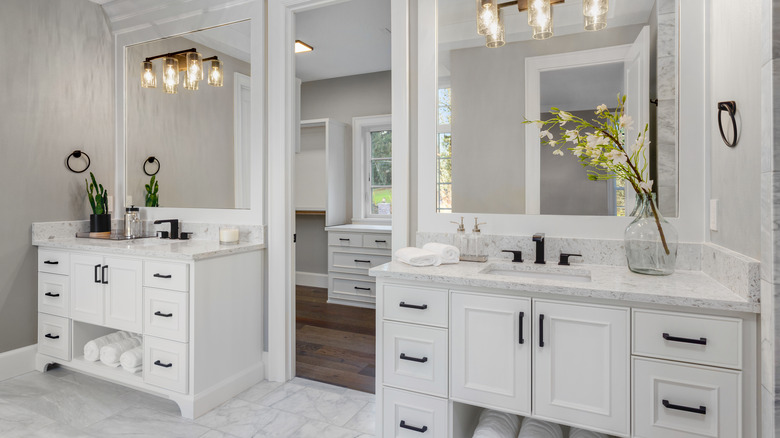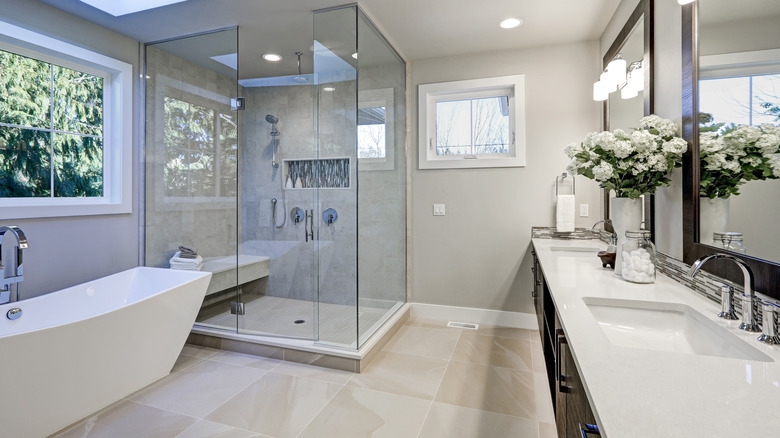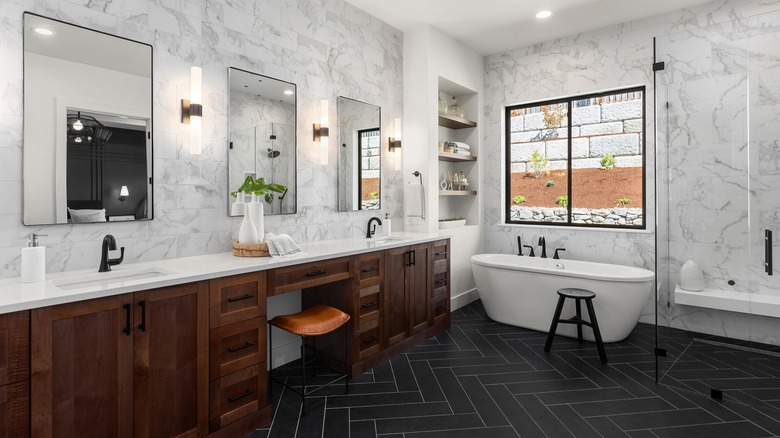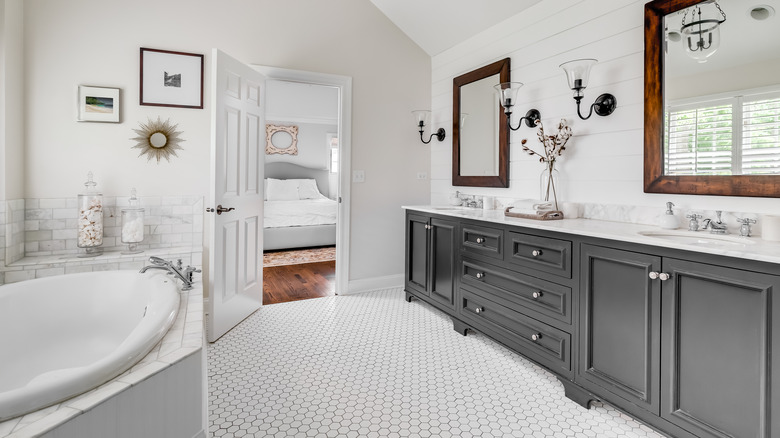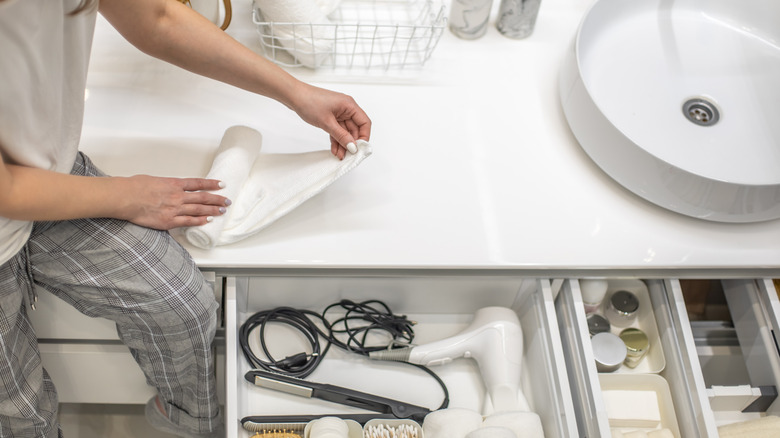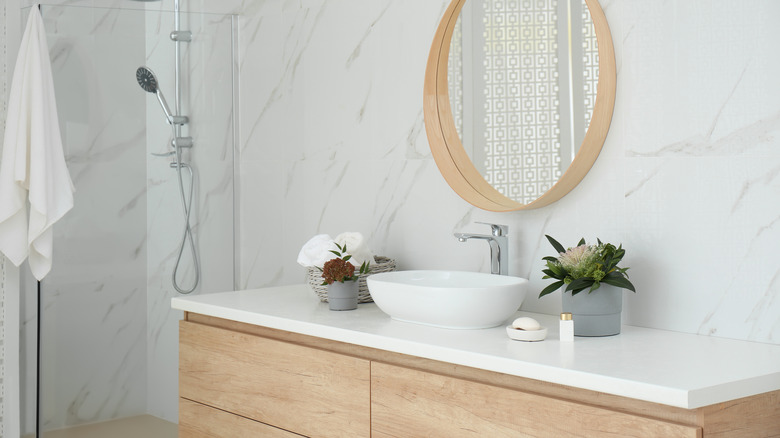How To Choose The Perfect Bathroom Vanity
Modern bathrooms are more than standard spaces in a home; they combine style and practicality, and achieving this elusive balance can be tricky. For most homeowners, bathroom remodels often mean changing the tile colors or even buying that beautiful tub you've been eyeing for a while. While these are great places to start, you also need to consider other vital elements that contribute to the functionality and aesthetic of your bathroom, like the vanity. The vanity is one of the bathroom's most versatile and valuable items.
According to Kurtis Kitchen and Bath, the vanity not only houses the sink but also serves as extra countertop space and even provides an additional storage area for your personal effects. While it is clear why every bathroom needs a vanity, getting the right one is often easier said than done. They come in a variety of styles, materials, and sizes, making it even more confusing to zero down on the right one for you. Here are a few factors that will help you choose the right vanity for your bathroom.
Pay attention to your bathroom size
Ultimately, how big or small your bathroom is should also inform the size of your vanity. While your storage needs matter, the bathroom's size is more important. A large vanity will most likely take all your functional space, and it might also look out of place if it is too big. While the size of the bathroom plays a critical role, you will need to determine how wide your vanity should be within the given space. According to Bellecor, the ideal vanity size for a smaller bathroom with a tight space is about 30 inches wide.
This particular size is neither too small nor too large for everyday bathroom activities. Another factor that is also worth considering is the height of the vanity. Usually, it would help if you went with who will be using the sink; kids' bathrooms need a shorter vanity than those in the primary bathroom or guest suite. Nonetheless, the standard 32 inches should be ideal for most bathrooms. Remember, getting the correct height is essential; going too tall or short is just as bad.
Function and frequency of use
Before settling for just any other vanity, you need to consider who would use it and what they would use it for. For instance, if it is for a master bathroom for two people who prep for work simultaneously, you might need to consider a larger vanity, preferably with two sinks. Also, a busier bathroom that serves more than two people needs to be durable enough to brave the daily wear and tear that comes with the frequency of use. Durability must join your list of priority needs if the bathroom vanity serves one or two people.
The good news is that when the vanity is installed correctly, it could easily last up to 60 years, via Modo Bath. Another essential consideration is the purpose of the bathroom vanity. If you use the vanity for fixing your hair and doing makeup before stepping out, consider one with enough countertop space and storage. You might also need a mirror with a lighting fixture to ensure you have everything you need to get ready.
Materials
Vanities are located in moist and wet environments; therefore, you must be very critical about the materials, especially the cabinets. The materials you choose for your vanity cabinet should be able to withstand the moist conditions typical of any bathroom. While there are plenty of options for your vanity cabinet, Flemington Granite recommends solid wood because of its durability and the general aesthetics of natural wood. However, the caveat is that you will need to control the humidity levels and moisture. Alternatively, plywood is another good option that also resists expansion and contraction that comes with temperature and moisture accumulation.
Nailing the countertop material also plays a massive role in the aesthetics and function of your vanity. The right vanity countertop should be able to stand up to toothpaste, water, and alcohol, among other cosmetic materials. Furthermore, avoid any countertop material that is difficult to clean, given the mess that most vanities are exposed to daily. Fortunately, most kitchen countertops work perfectly well in the bathroom too. If you are doing a bathroom makeover, the trick is finding the right vanity countertop before the tile or cabinet style. It is much easier to find tiles and cabinets that match the countertop than to find a countertop style to fit your unique bathroom tile.
How much storage do you need?
Among the many reasons your bathroom needs a vanity is to create more storage for your cosmetics, razors, or even fresh towels. However, every household's needs are never the same; this is also true regarding bathroom storage requirements. Determining the right amount of storage in your bathroom is often not that simple. However much you think you need when it comes to storage, consider adding 20% more to be safe. One hack that will help you figure out just how much storage your vanity should have is taking inventory of what you need and use daily.
Decide what you need close and what you can keep away from reach. This will help you know exactly what should go to the vanity and what should be stored elsewhere. For ample storage and sleek design, consider floating cabinet vanities. They provide an airy feel to your bathroom while providing extra storage than their traditional counterparts, via Reico Kitchen & Bath. Depending on your vanity's size, you can place other storage facilities on top of the countertop for that extra storage you might be missing.
Choose the right sink
One way of sprucing up your vanity is getting the right sink to match. There are so many types of sinks, each presenting a different factor to consider. Whether it is size, color, material, or shape, there is much to mull over when researching the right sink for your vanity. The variety of choices available can be overwhelming at first, but remember that it will be installed on the countertop. So how much space you need will determine how big or small the sink should be. If you plan to install two sinks, that will mean twice as much space taken off your countertop.
It is also worth noting that some vanities will only allow the installation of one sink because of the design of cabinets and drawers. Therefore, you must determine whether you need one or two sinks before settling on the vanity style. However, if you have difficulty figuring all these factors out, The Bathtubber recommends the following: Make sure you leave between 4 to 6 inches on either side of the sink. Be sure to consult accordingly to get the right sink depending on the size of your vanity.
